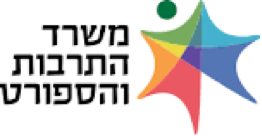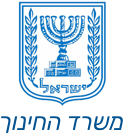Prayer is the pillar on which our nation rests. The Jews' daily schedule, the holidays, Shabbat, and events - all revolve around prayers. This is man's way of talking to his Creator, connecting and communicating with Him.
Many Jews showed tremendous devotion by continuing to pray in public despite the express prohibition. The plans of the Nazi oppressors established special working days on Shabbat and holidats, lest the Jews gather in prayer houses to pour out their prayers before the Master ...[Read more]
Prayer is the pillar on which our nation rests. The Jews' daily schedule, the holidays, Shabbat, and events - all revolve around prayers. This is man's way of talking to his Creator, connecting and communicating with Him.
Many Jews showed tremendous devotion by continuing to pray in public despite the express prohibition. The plans of the Nazi oppressors established special working days on Shabbat and holidats, lest the Jews gather in prayer houses to pour out their prayers before the Master of the World, but various ways were found to circumvent the decrees and gather for prayer and supplications. This is how Jews behaved in the labour camps and in underground conditions, and even those who were far from Torah and prayer, were deeply impressed by this devotion and came closer to their birthright.
Prayer books were also written by hand, in underground conditions, on torn pieces of paper, from anything they could get their hands on. By memory, the holy ones wrote down the Jewish prayers, so that they could pour out their supplications before the Master of the World, so that the world would not be left without a siddur (prayerbook).
Even in the extermination camps, no effort was spared, and no sacrifice was too great, in order to fulfill the mitzvahs of the Torah. "It was worth it"! cried the 14-year-old boy, when he received 50 brutal lashes for hiding prayerbooks.
Before you is a collection of stories, photographs, and testimonies from the archives of Ganzach Kiddush Hashem, which tell the stories of Jews who did not surrender to the cruel reality and tried to preserve, even to some extent, with the possibility of praying to their G-d.
Yitzchak Meir Shpernowitz - Prayer in Siberia (Ostrow Ozowiec, Poland)

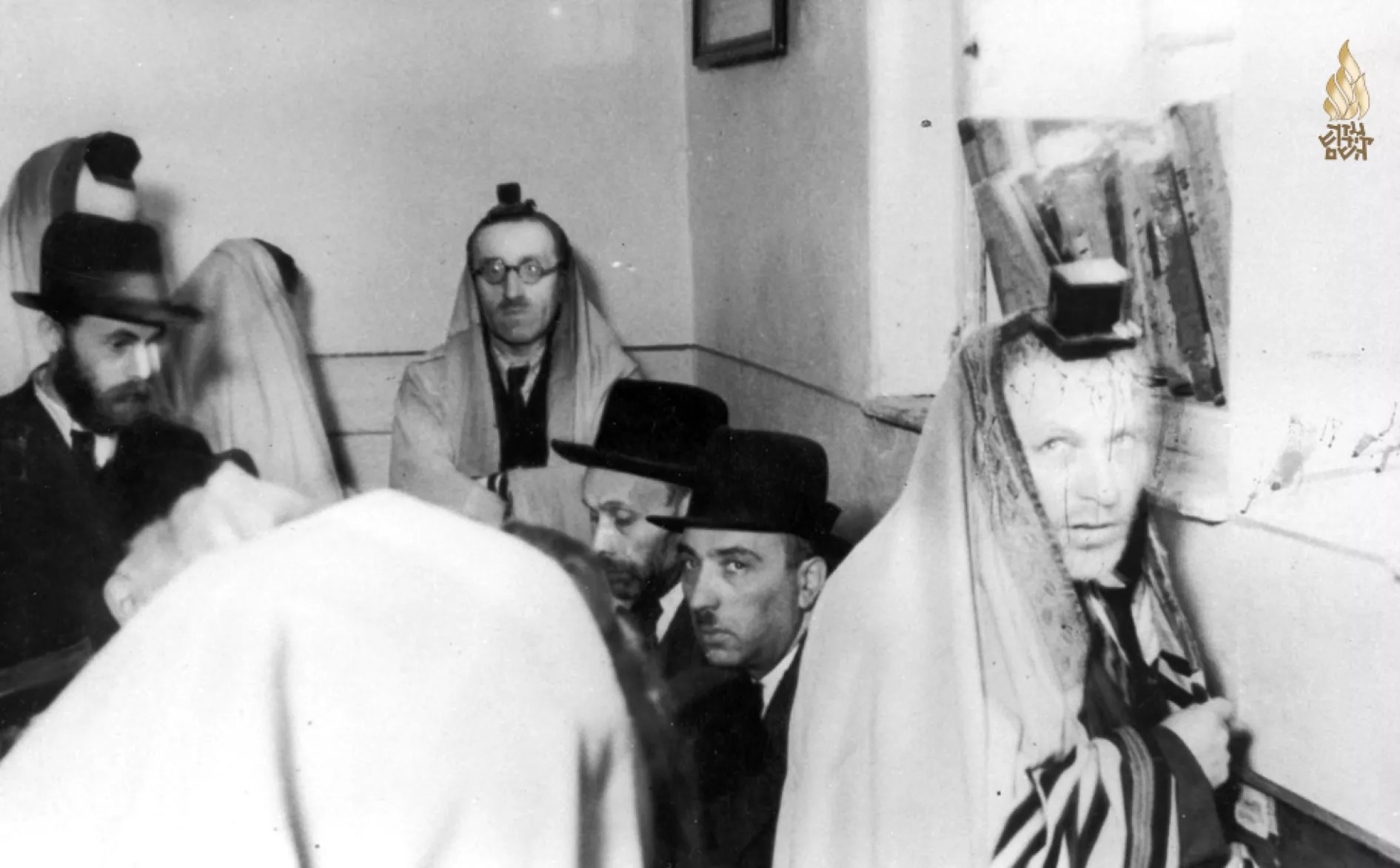
Praying in a synagogue in Krakow
Menachem Haberman - A Special Bar Mitzvah Gift (Munkacs, Czechoslovakia)

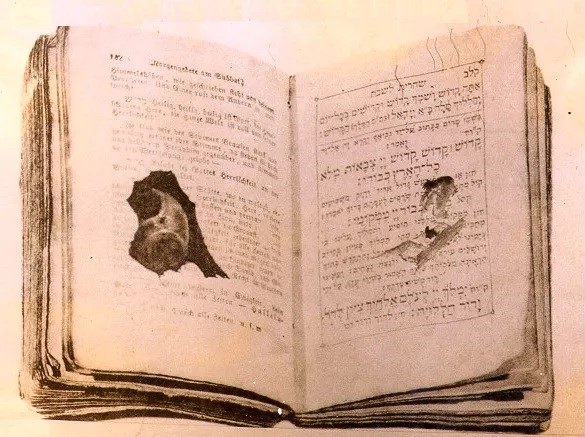
A prayer book that was penetrated by a German bullet
"It Was Worthwhile"
"It Was Worthwhile"
One day, I was lying on my bunk in the children's barracks in Auschwitz and I saw the deputy commander of the barracks walking with a thick rubber tube in order to whip someone. I jumped out of my bunk and wanted to see who was going to be whipped. There were lashes for everything, and the number of lashes was according to the greatness of the offense. That day the rubber tube was put into use. Usually they used a stick, which broke many times in the middle of the beating, so they started using a rubber tube, and I wanted to see how it worked. I jumped out of my bunk to see how it worked; I might have to meet this rubber at some point.
The deputy commander of the barracks went to one of the bunks, and the boy who was there, already knew and was waiting for him. The deputy told him to "get down", and he got down and bent down and they started beating him. We, a group of boys who stood around, looked and counted each of the lashes to ourselves. The boy didn't cry or shout, didn't even sigh. We were very surprised, we didn't know what it was… and he continued. 25 lashes had already passed. Usually there were 25 lashes, and now thirty had already passed. When he passed the fortieth blow, he turned the boy over and began to beat him on his legs and head. The boy didn't sigh, didn't cry, nothing - a 14-year-old boy didn't cry. The soldier got very angry and finished the fifty and left. He got up. I remember a big red mark on his forehead from one blow with the rubber tube. We asked him why they beat him, so he answered: "It was worthwhile; I brought my friends some prayer books." And he did not add anything more. He got up, got on the bunk, and sat down.
(From the testimony of Zalman Kleinman at the Eichmann Trial)
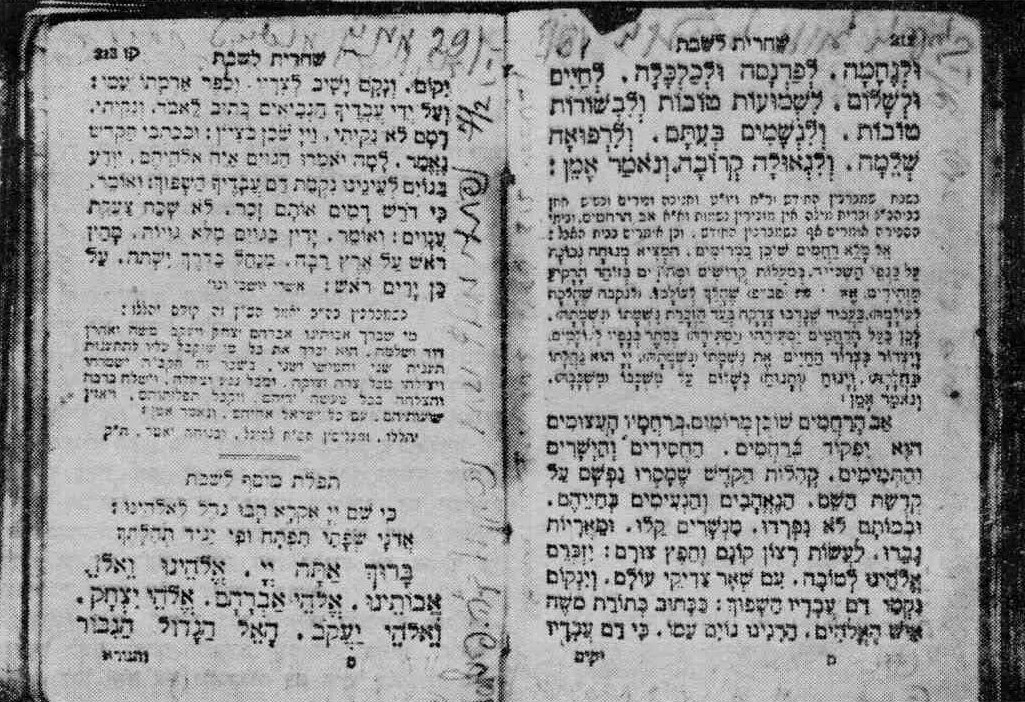
A page from a prayerbook in the margins of which the owner wrote notes in pencil
Tefila Le’Ani (Psalm 102) on Prayers and Worshipers (Hebrew article)
Tefila Le'Ani (Psalm 102) on Prayers and Worshipers
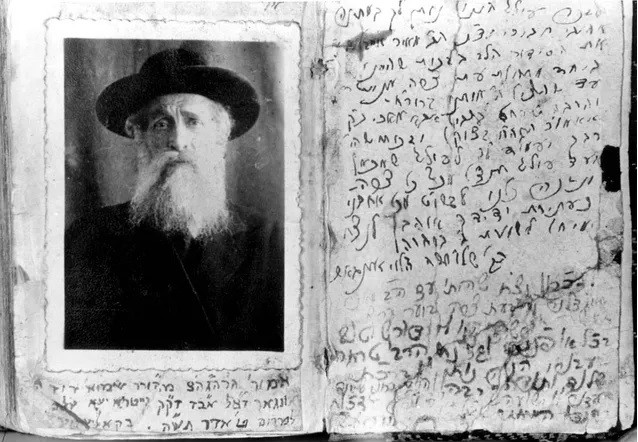
A portrait and a page from a prayerbook from which Rabbi Unger prayed while hiding in the woods from the Nazis
Avraham Wartheimer – Thou I Walk in the Valley of the Shadow of Death (Medias, Romania)

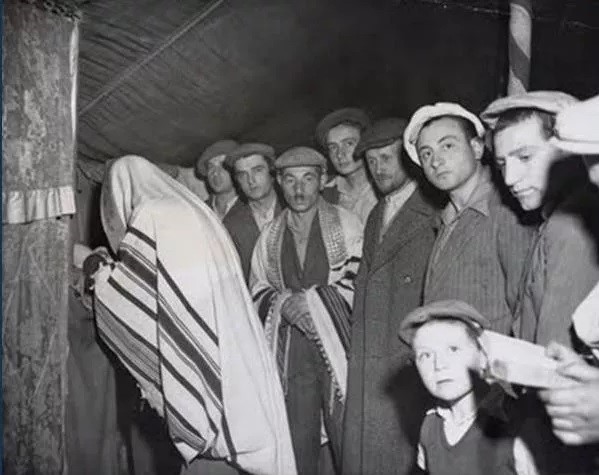
Praying in the synagogue in a detention camp in Cyprus
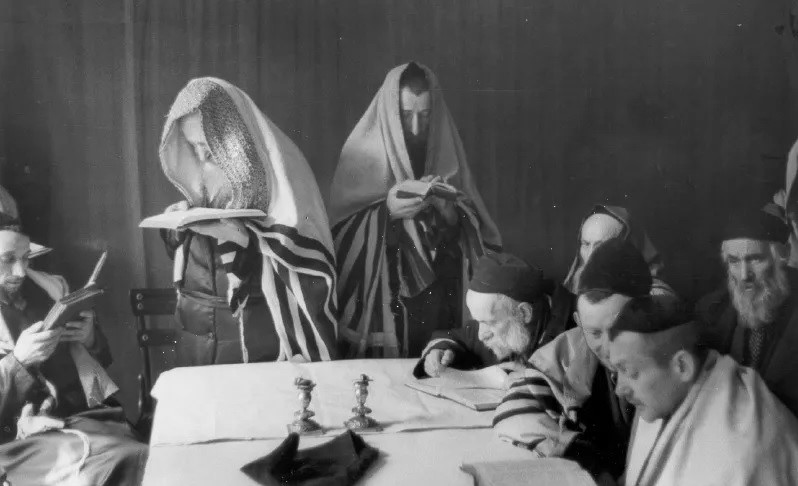
Praying in a synagogue in the Warsaw Ghetto
Sarah Geiger - A Siddur (Prayerbook) in the Lodz Ghetto (Lodz, Poland)

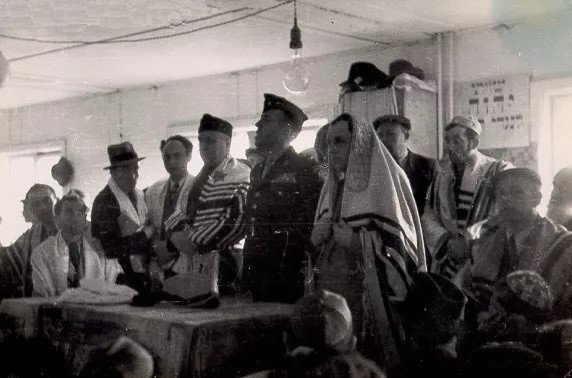
Praying in a synagogue in a DP camp in Germany
Mother's Prayer
Mother's Prayer
And here my foreman, a Jew from the ghetto, appears in front of me. I spoke with him and he told me that he had just returned from the concentration point in Freedom Square, where the Germans rounded up thousands of Jews for shipment. Those sent were without work certificates, or their certificates were not approved and stamped.
The Germans signed his certificate - he said - and released him to his own devices. I debated whether I should also go to the square and get a stamp that would save my life, or it might be dangerous to go near there, lest the Germans decide for some reason not to give me a stamp and include me in the shipment.
I returned to my parents to consult with them. After we considered both sides, it was decided that I would go out and G-d would protect me. With great emotion and from the bottom of their hearts, my father and mother blessed me that G-d would make me successful and that I would return in peace. That's how they blessed me again and again. And finally I went out towards the square with the blessing of my parents as they worried about my safety and raised prayers to G-d to protect me from all harm. They were full of hope that I would be left behind and survive this brutal aktion (roundup).
On the night of Rosh Hashana, two other young men stayed with me in the apartment. Each of us stood in a different corner and prayed the Rosh Hashanah night prayer out of broken hearts. We cried and prayed, we prayed and cried.
The first day of Rosh Hashana. The Germans announced that all uninhabited homes would be locked and the entrance to them would be marked accordingly. All valuable furniture and utensils were removed from the houses and from then on entry to these houses was prohibited. So that our apartment would not be marked and closed, I stayed in the apartment together with the young man who was with me. That's how we stayed at home on the first day of Rosh Hashana. Concentrating on prayer was quite difficult but, with broken hearts, we tried to pray and request from G-d.
The Rosh Hashana prayers were said to the tune of the Book of Lamentations... This was a prayer for the loss of our loved ones who were taken from us suddenly. There was special meaning in the prayer "U'Netaneh Tokef", when we who are doomed to die pray. "Who will live and who will die, who by water and who by fire, who will be strangled and who will be stoned…" The prayer is said in a whisper for reasons of caution, but the heart cries out loud.
Then, in these difficult moments, I suddenly remembered my mother's prayer and the last words of my father, who ordered me to make an effort and be strong and thus stand firm in the fight for life. I poured out my heart like water before G-d and my heart was full of faith and confidence that with G-d's help I would be saved from the abyss of killing and my dear mother's prayer would be fulfilled.
On the second day of Rosh Hashana, they took all the Jews concentrated in buildings next to the square to the train. The destination - Belzec extermination camp...to their last journey.
The second day of Rosh Hashana is the day set for the "yartzeit" (anniversary of death) of my family members; may G-d avenge their blood and that of all the victims from Tarnow.
(Mother's Prayer, the Holocaust with Complete Faith, Natan Ginzburg)

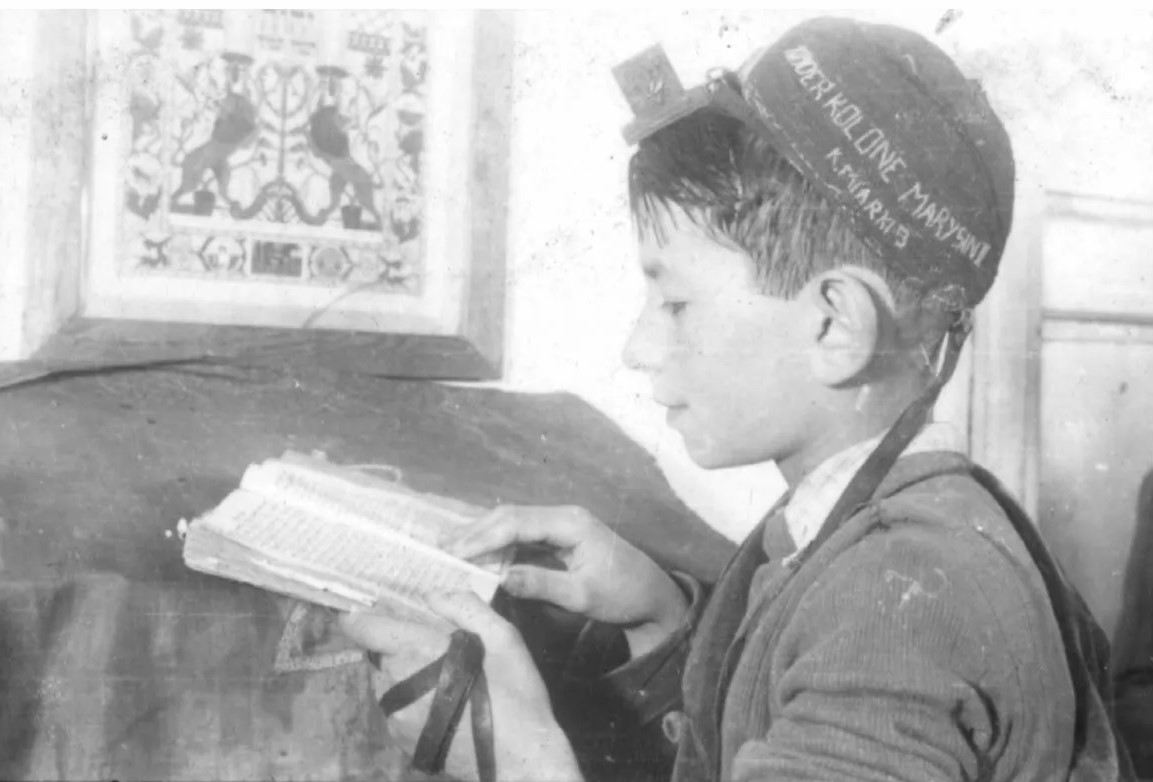
Praying in the Lodz Ghetto
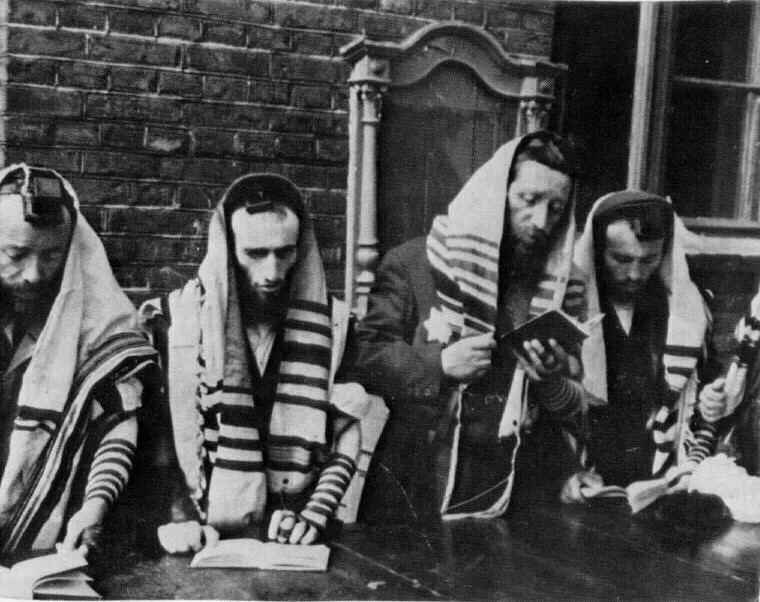
Praying in the ghetto
Rivka Avichayil - The Shema Yisrael Prayer in the Catholic Church (Paris, France)

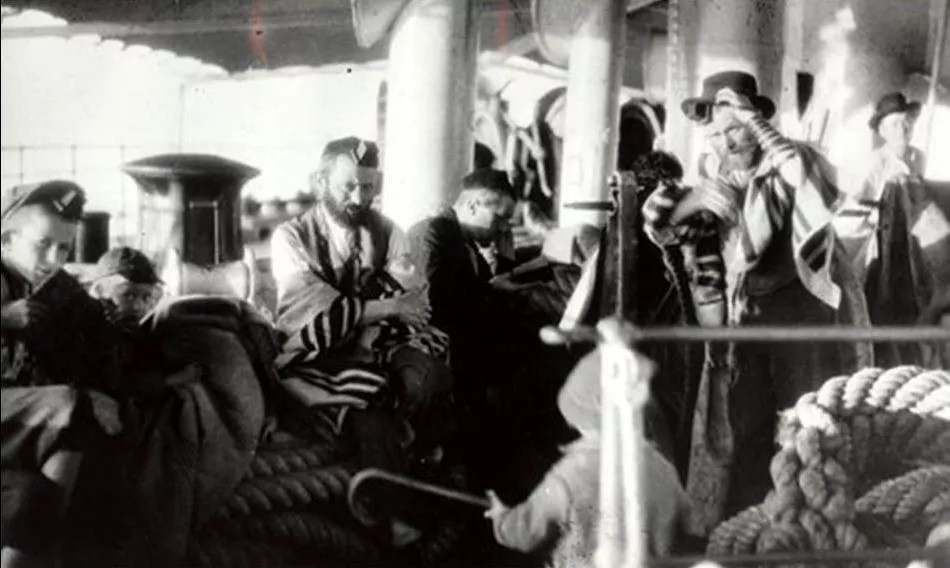
Praying on an illegal immigration (to pre-state Israel) ship
Poria Sokal - Reciting the Shema Prayer on the Bunk (Warsaw, Poland)

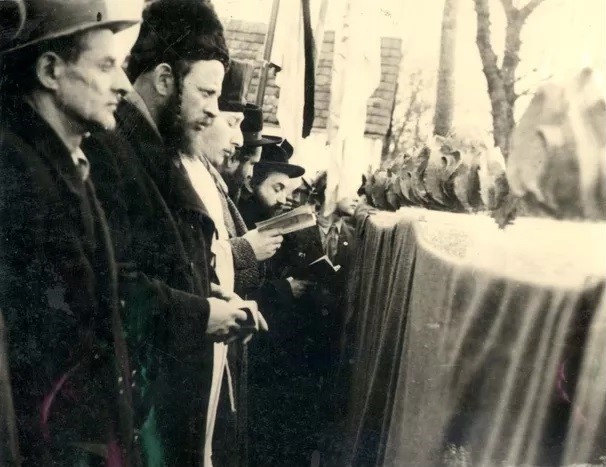
Prayer service in memory of the Holocaust victims, held in a DP camp in Germany
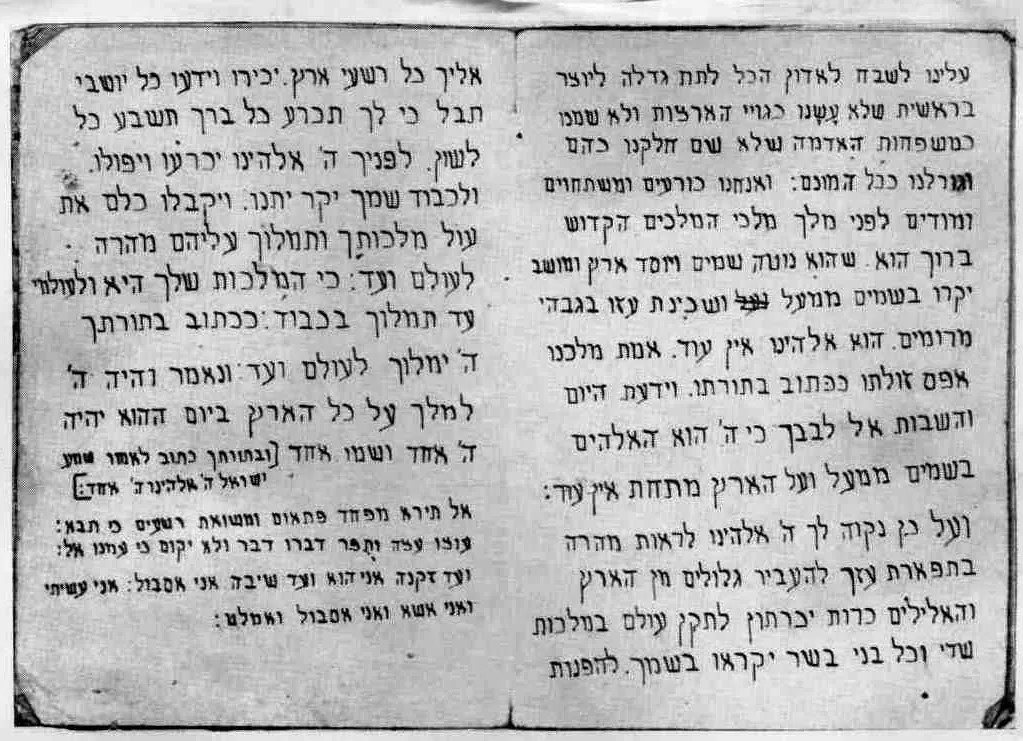
The Aleinu LeShabeyach (It Is Our Duty to Praise) prayer handwritten in the Buchenwald concentration camp, Germany
Chaya Chava Erlanger - A Siddur (Prayerbook) in Auschwitz (Lodz, Poland)

The Last Prayer of the Jew 48723
The Last Prayer of the Jew 48723
In the extermination camp that we were in, Jews did not have names, only numbers. In all matters that a Jew was addressed about in the camp, he was addressed by his number. From the day he came there until his death, until he was taken to the crematorium, he entered and left only with his number, which was registered in the camp office. Even among us, the shadowy Jews, the living-dead, we called each other by number and not by name, lest we forget each other's number.
When we arrived at the camp we had to, in the blink of an eye, undress and bring the clothes to the camp warehouse. One of the goals in handing over the clothes and belongings was to ensure that no money or valuables were left in the hands of the Jews. After several moments in the camp, you stopped being a person among people, you stopped thinking about the past and the future. You didn't try to hide anything. Even when an opportunity came to you, you stopped. The Jews gave everything up with composure, but we did not give up on these: tallises (prayer shawls), tefillin (phylacteries) and siddurs (prayerbooks). In the warehouses, the SS men had to beat the Jews, wrestle with them, and forcefully snatch from them their tallises, their tefillin bags, and their siddurs from their hands. With sadistic pleasure, they robbed the holy objects from their victims. And the warehouse - clothe the naked. Upon giving up our clothing, we were given camp clothing. With pencils they wrote our numbers on the left side of our shirts - it's your number. From now on you don't have a name or a last name. You come in with a number and you go out with a number, and if your life is precious to you - remember your number, remember and don't forget!
Jew number 48273 assigned Hebrew names to the roll call according to the Jewish prayer times: Shacharit, Mincha, Maariv. These names were accepted by us and entered our minds, the style of a dying Jewish community, which wanted to make an effort not to forget the times of prayer.
But in addition to the regular roll call, there were irregular roll calls. Sometimes the census would last a whole day. Don't move a limb, don't utter a syllable. You're standing for roll call! Cold - freezing, Gestapo men.
From time to time a cry of terror would break out, which would freeze every drop of blood in us, and a Jew would fall… dying, dead…
We once noticed him, in Jew 48273, a short Jew, with a pale face, fiery burning eyes - in his hand he was holding a small book of Psalms, reading from it, his pleasant voice minute by minute: "Praised be the man whodid not follow the counsel of the wicked, nor did he stand in the way of sinners nor sit in the company of scorners...." (Psalms 1:1)
He was fully burning with the fire of enthusiasm, and we - stood stunned. We were ashamed of ourselves. We looked at him with intense envy.
This dear Jew, even while being abused by those with impure blood, is engaged in noble matters. In the book of Psalms, the prayers of David son of Jesse, the pleasant songs of Israel… and so he did in every roll call and order. When he was not watched over, he raised his voice and cried, and when he was watched over, his voice was lowered and whispering.
For a long time we wanted to know who Jew number 48273 is; what is his name and surname? But all our inquiries and demands were in vain. We would receive a similar answer to all questions - "at such a time there are no individuals in the Jewish People. We are all one population, who sacrifices his life for the sanctification of G-d's Name, without "Kaddish" and without generations of successors. For one of us - only a number, and my number is 48273, and similar to me, with this number I will stand before G-d's court…"
It happened Tuesday night. We tried to take a nap and catch some sleep in the dark of the night. The cold was great, our teeth chattered and we shivered in our flesh. Suddenly - a howling whistle pierced the darkness. To the roll call.
The Nazis with whips in their hands called us to roll call. We stood broken and torn. Winds started blowing. From moment to moment they got stronger, stronger, and stronger; raindrops, and then a downpour. We stand without shelter and concealment, but with just a shirt, without shoes and without a coat; we stood as one group, stuck to each other, and then we noticed Jew number 48273. He was standing all pale. From under his wet shirt he took out the small book of Psalms, and began humming the holy verses. None of us made a sound. We stood speechless and looked up to Jew 48273 as a redeemer and savior.
He did not notice this, he was full of supreme enthusiasm, his eyes were downcast, his lips were mumbling. Its pleasant melody as the sound of a thin silence, but we heard every sound. And suddenly a crowd of tyrants appeared. The commander stood tall and broad shouldered and with a corrupted face, moved between the ranks, pushed and shoved, slapped the cheek, kicked and hit with the belt in his hand.
We all stood and trembled, imagining that our last moments had come, suddenly we heard the sound of his shouting: "What are you holding there Jude? Come here!" The words were aimed at the owner of the Psalms, and lo and behold - while drawing his gun, the Nazi approached the owner of the Psalms, who remained standing in his place, continuing and moving.
"Stop your tune, and stop mumbling with your lips, damned sorcerer! You drive me crazy and shake my nerves!" - cried the Nazi.
Number 48723 did not pay attention to everything that was done and said, and continued to move enthusiastically, raised his voice and read his verses. The Nazi commander stopped in his tracks, his gun was pointed at the Jew who was moving and praying. His dog, which lay at his owner's feet, rose to his feet and jumped towards the Jew with the Psalms. We all stood still. We couldn't believe our eyes. And suddenly - the Jew knelt down and fell, lifeless. The Nazi commander lowered his hand, turned his back, and walked away. And we all stood around, with our mouths open and our tongues stuck to our palates. A sharp whistle was heard - a sign to return to the barracks.
Our heart weeps for Jew number 48723, our brother the psalmist, and before we dispersed to our barracks we heard the young man in our group say: "Oh G-d of vengeance, Oh L-rd, Oh G-d show vengeance!" (Psalms 94:1)
(L. Feingold, "Beit Knesset," Tel Aviv, Nissan 5708/1948)
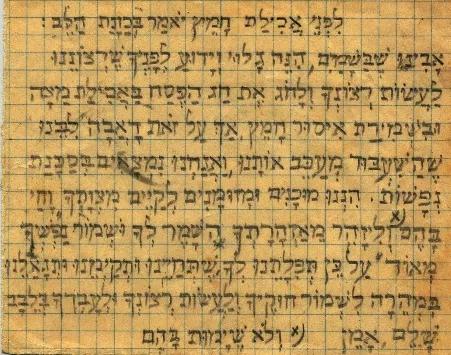
A special prayer composed in the Bergen-Belsen camp to be said before eating chametz (leaven) on Passover
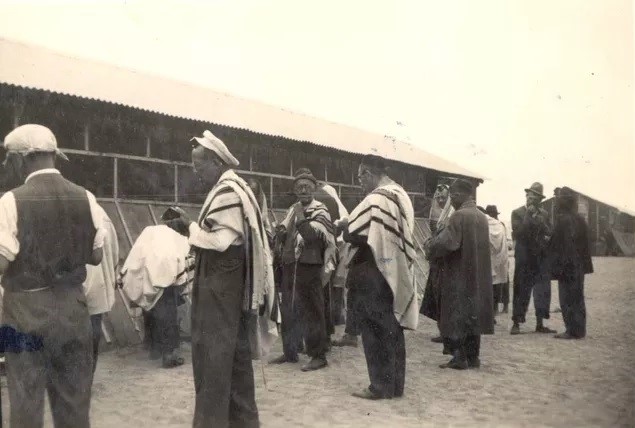
Jewish prisoners pray outside their barrack in the Gurs camp, France
Menachem Haberman - 90 Years of Prayer (Munkacs, Czechoslovakia)

Penina Oren - The Shacharit Prayer (Poland)

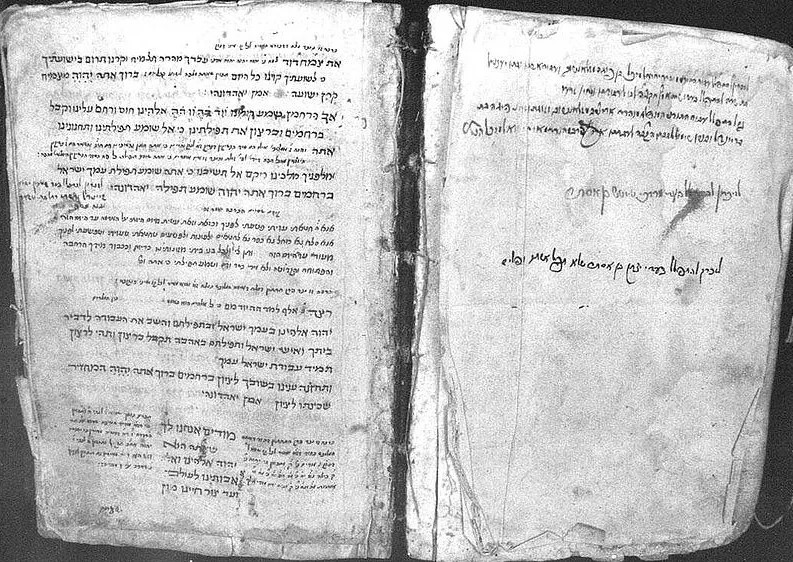
A page from the prayerbook of Rabbi Yisrael Baal Shem Tov
Zalman Cohen – Rabbi Hershel Schachter and the First Yizkor Prayer in Buchenwald (Nyiregyhaza, Hungary)

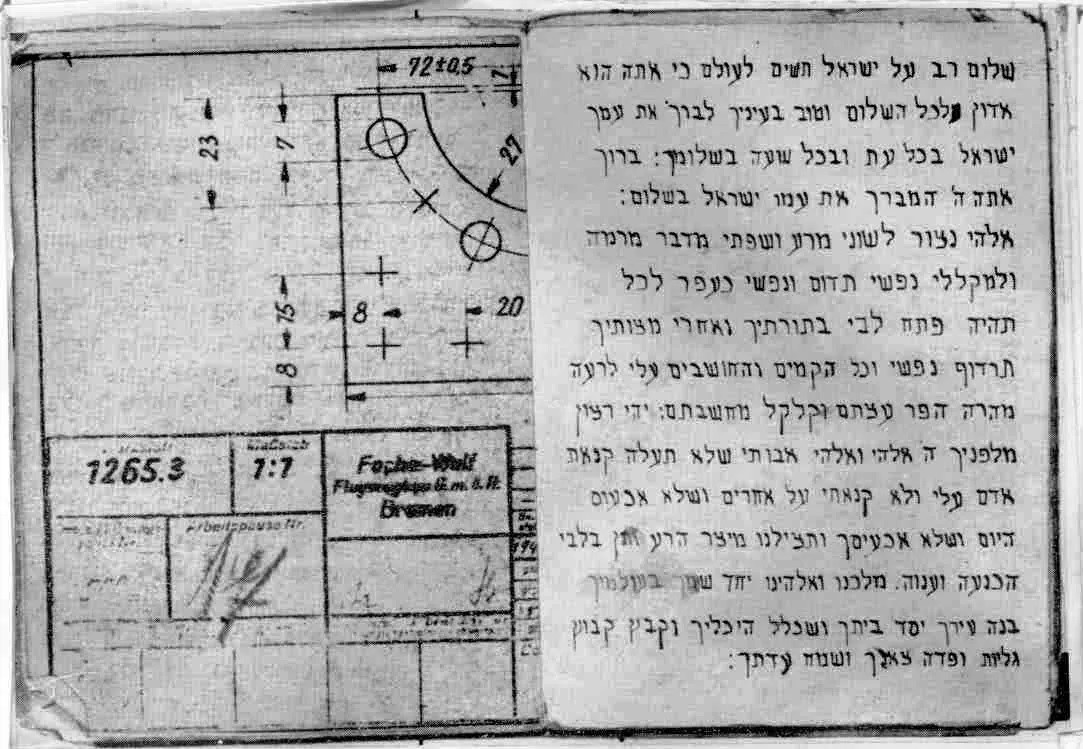
A page from a prayerbook written in the airplane workshop in the Buchenwald concentration camp
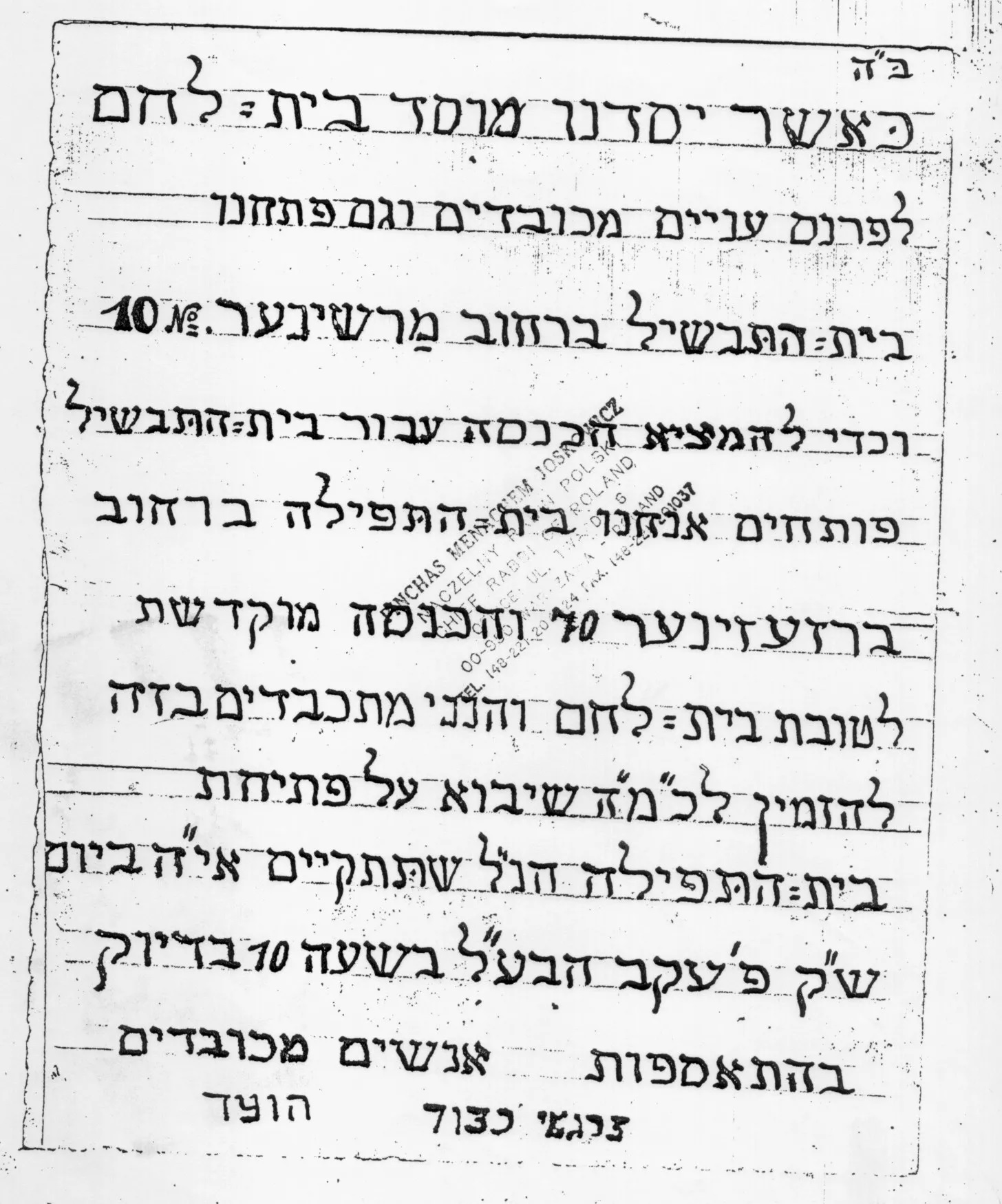
An invitation to participate in the opening of a synagogue by the Beit HaTavshil (stew house) organization
Yehudit Hamdiger – The Yizkor Prayer with the Home in France for the “Children of Buchenwald”

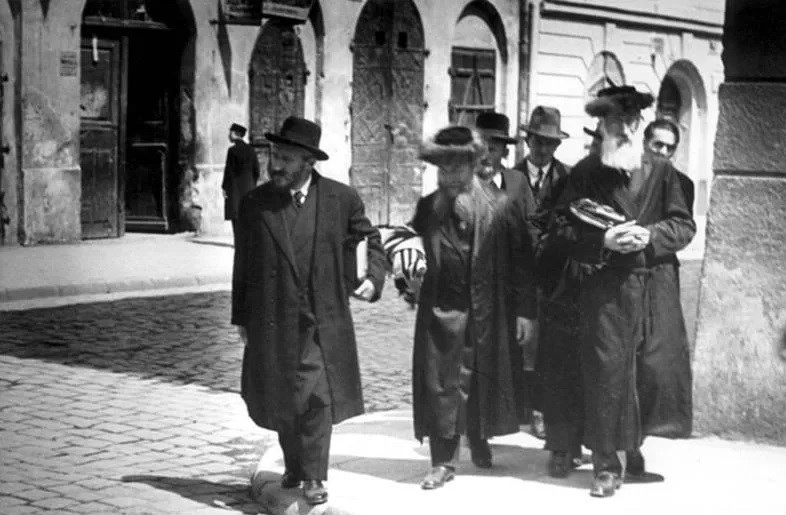
Chassidim on their way to prayer on a street in Kazimierz, the Jewish quarter of Krakow, Poland
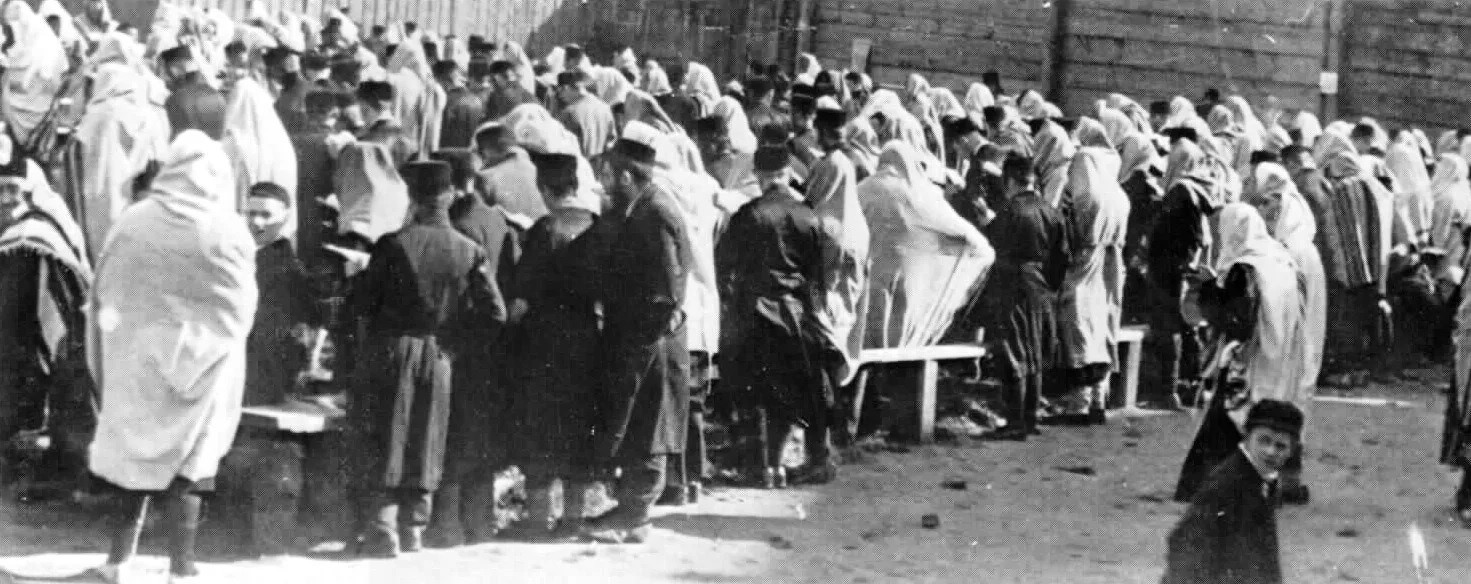
Chassidim who came to the Gerrer Rebbe, pray in the courtyard of his study hall
Dov Silber - The First Prayer after Liberation (Piotrkow, Poland)

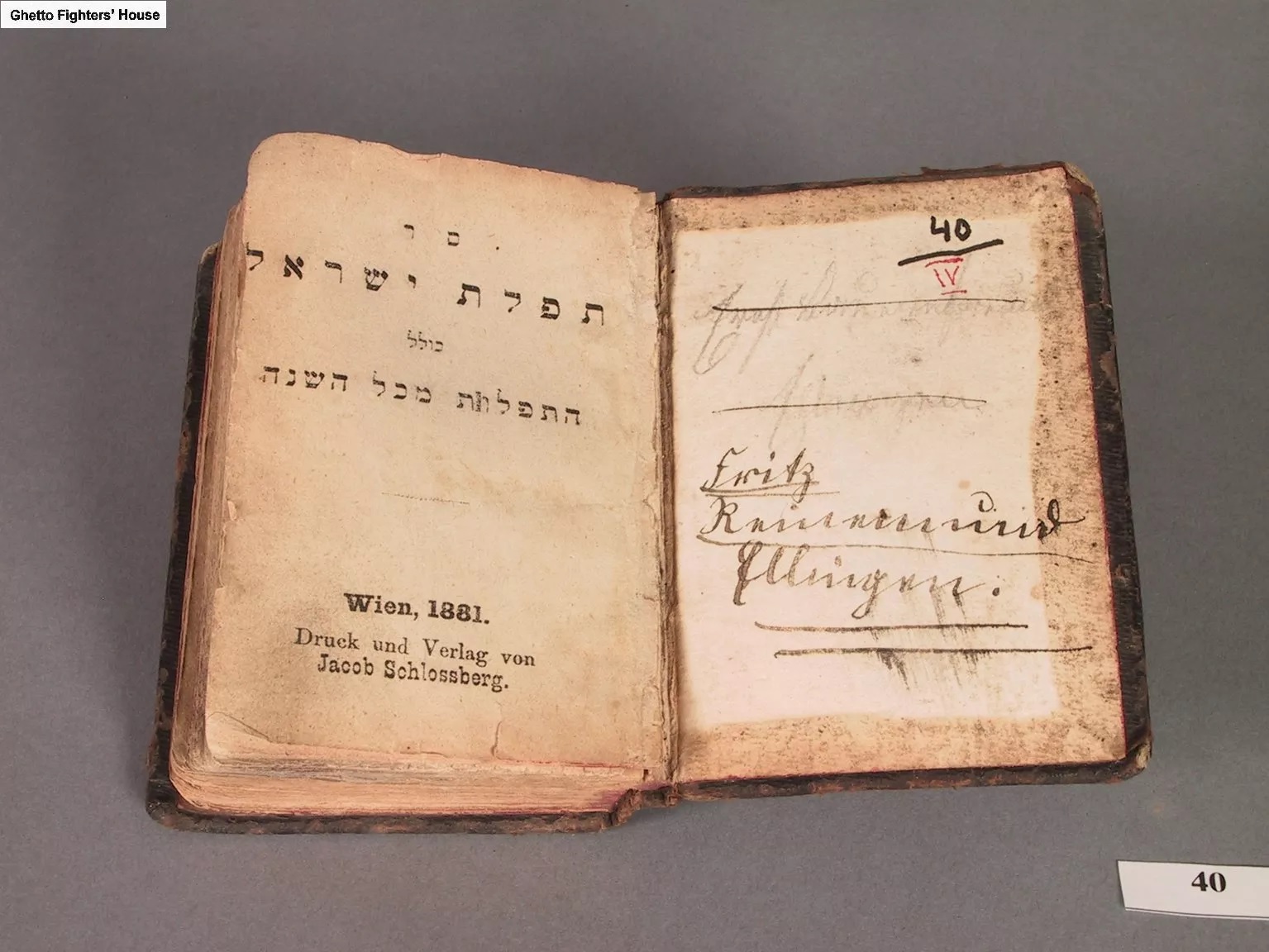
A prayerbook printed in Vienna in 1881 that was found amongst the ruins of the Warsaw Ghetto
Lavia, The Teacher from Libya
Lavia, The Teacher from Libya
Shortly after we arrived in Bergen-Belsen, about two hundred Jews, with British citizenship, from the cities of Benghazi and Tripoli in Libya, in North Africa, arrived at the camp. The arrival of these families deeply shocked us. Is there no limit to the hatred of the Nazis towards the Jews? In their panicked retreat from North Africa, the German army did not have enough time to transfer most of the weapons from Libya to Italy, but they did not give up the Jewish "booty" - dozens of families, including babies. The Germans transported them through the Mediterranean Sea and then by train, a distance of nearly 3000 kilometres, to the Bergen-Belsen camp! These families looked, when they arrived in Bergen-Belsen, as if they had just been exiled by the evil Titus from the ruined Jerusalem.
The central figure among the members of these families was undoubtedly the figure of Lavia, a young and righteous teacher. His last name was probably "Lavi," but everyone called him Lavia. He is etched in my memory as unique and special, righteous and a hero, kind and brave.
The time: eleven in the morning. The second roll call has just ended, the counting of all the prisoners who did not go to work outside the camp. There was a long line of about thirty children on the field, led by Lavia the teacher. They sing Hebrew songs: "Am Yisrael Chai," (the nation of Israel lives), "Blessed are we, how good is our portion, and how pleasant is our destiny, and how beautiful is our inheritance."
The song that was especially loved by the teacher and the children was: "Bear your flag to Zion. The flag of the camp of Judah. By vehicle or by foot. Let us become one. Together we'll walk, go back. To the land of our forefathers. To our beloved country. The cradle of our childhood." I did not stop looking at this holy sight. What mental bravery! Even the SS officers stood, as if hypnotized, and did not dare to harm Lavia.
As soon as he arrived in the camp, Lavia began to organize a "school" for the children who came with him from Libya, despite the strict ban on education. Lavia was above the law. He did not recognize any other laws but G-d's Torah, so he dared to sit the students in the middle of the roll call field and teach them the prayer: "Yigdal Elokim chai ve'yishtabach" (Magnified and praised be the living G-d). The children sang in the valley of the shadow of death and cried out to their Father in Heaven: "Yishlach La'ketz yamin meshicheinu, lifdot mechakei ketz yeshuato" (At the end of time, G-d will send the Messiah, to redeem those who wait for His salvation).
I learned a lot from the self-sacrifice of Lavia, the teacher from Libya who would not give in.
(It Will Be Told For Generations - Yona Emmanuel)
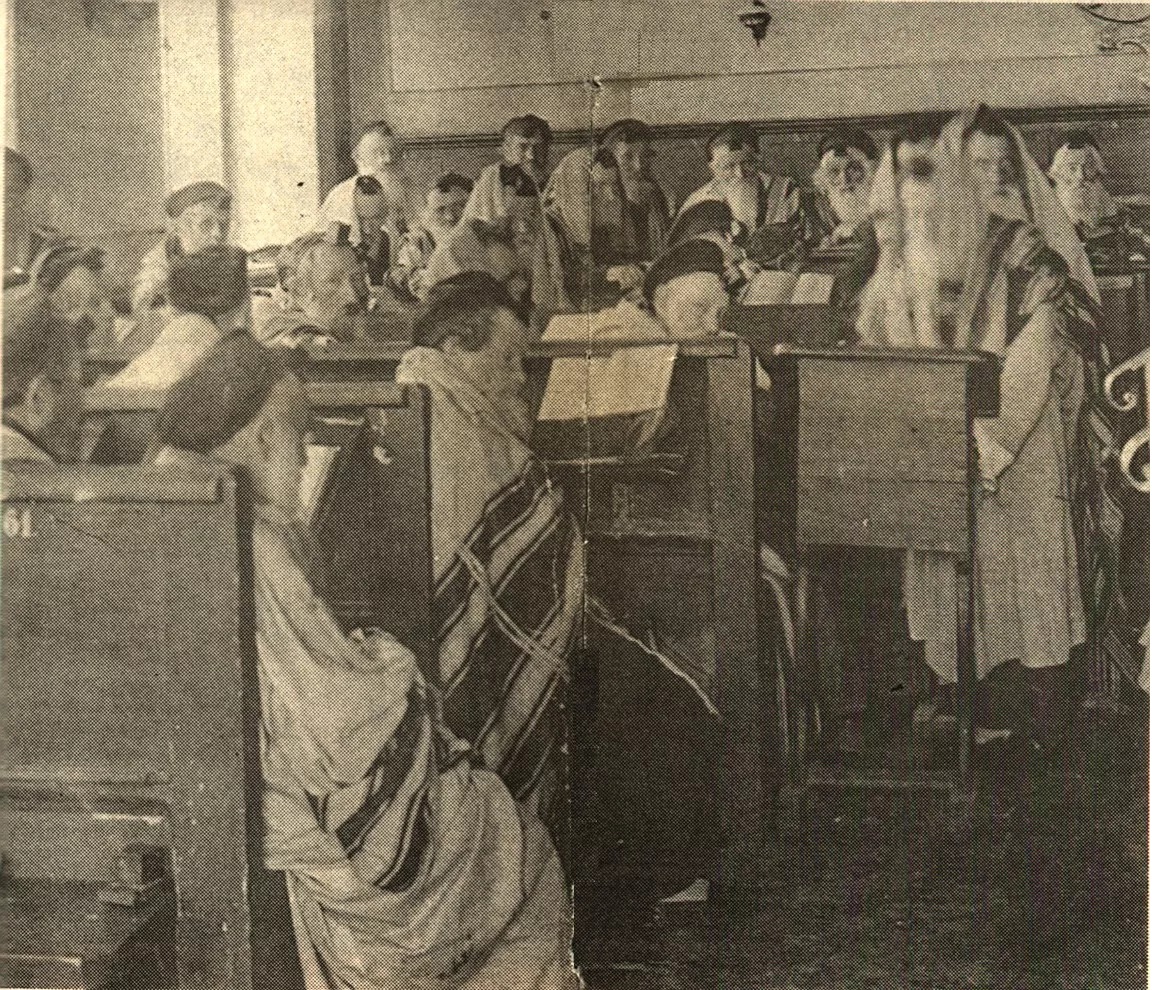
Jews praying in the synagogue in Vilna, Lithuania
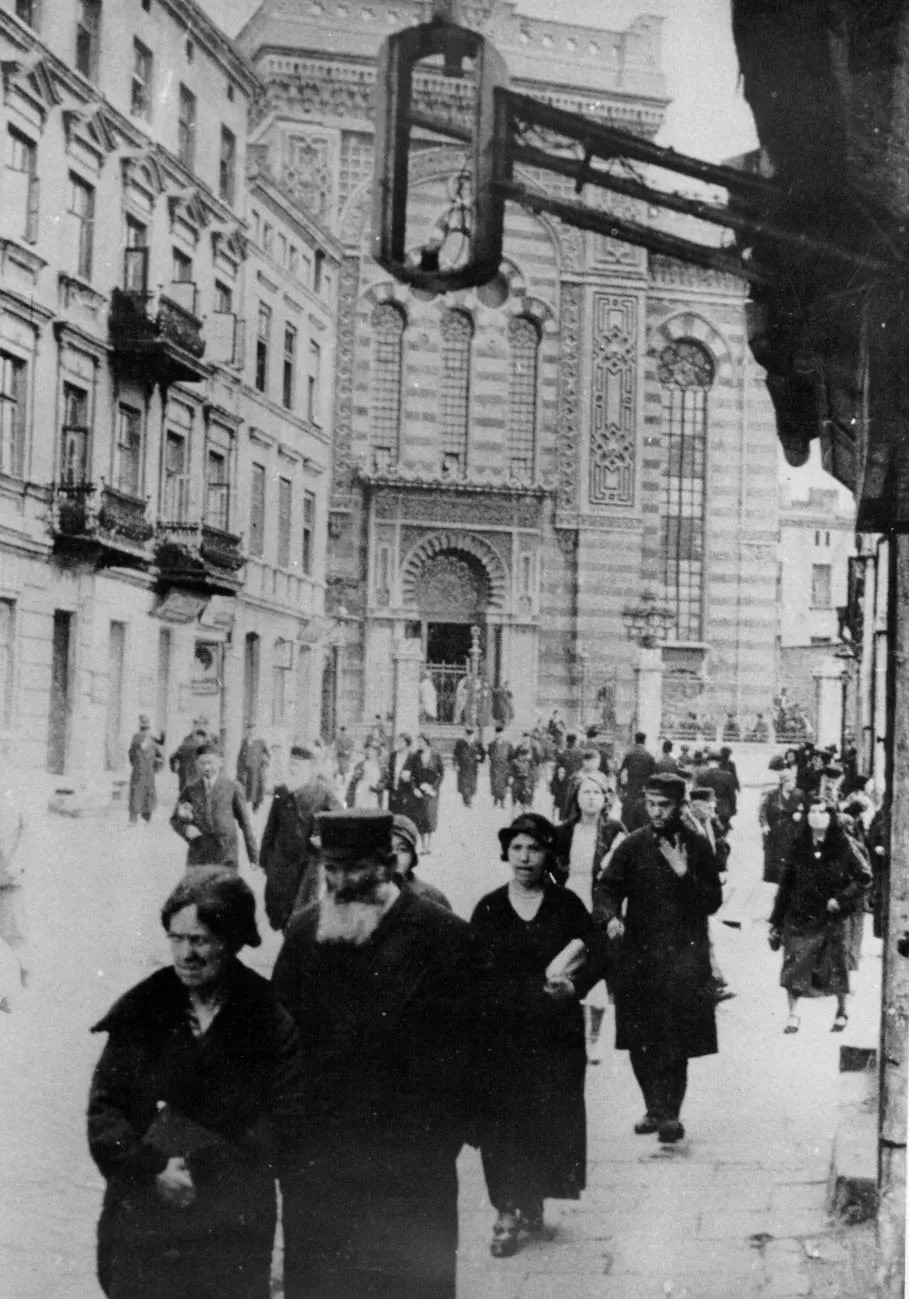
Jews returning from praying in the Great Synagogue on Walborska Street in the Balut quarter of Lodz, Poland
Yaakov Yehoshua - A Chapter of Psalms as a Birthday Gift (Germany - Holand)

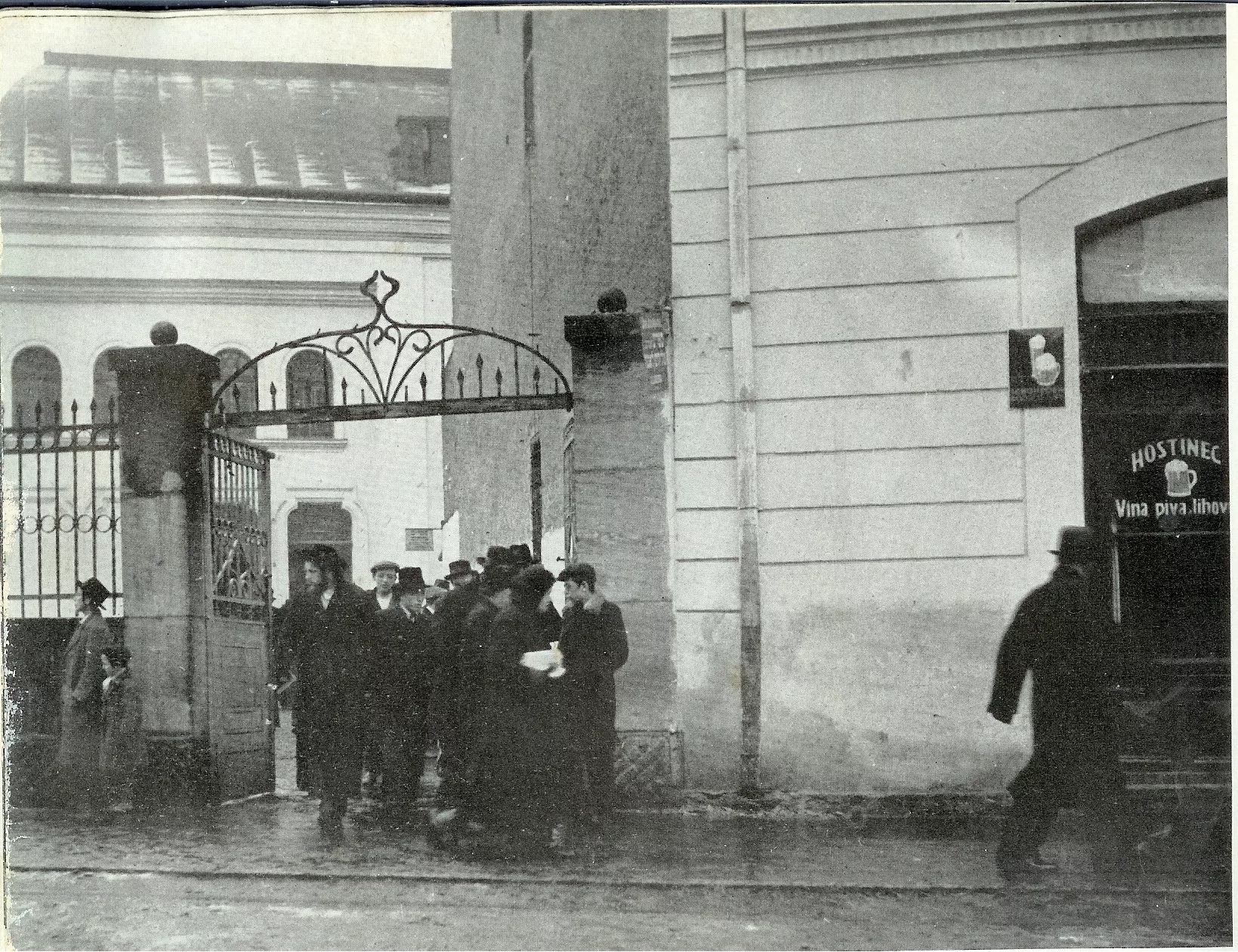
Jews leaving the synagogue in Munkacs after prayers
Chana Moskowitz – Memories from My Father’s Home (Bucharest, Romania)

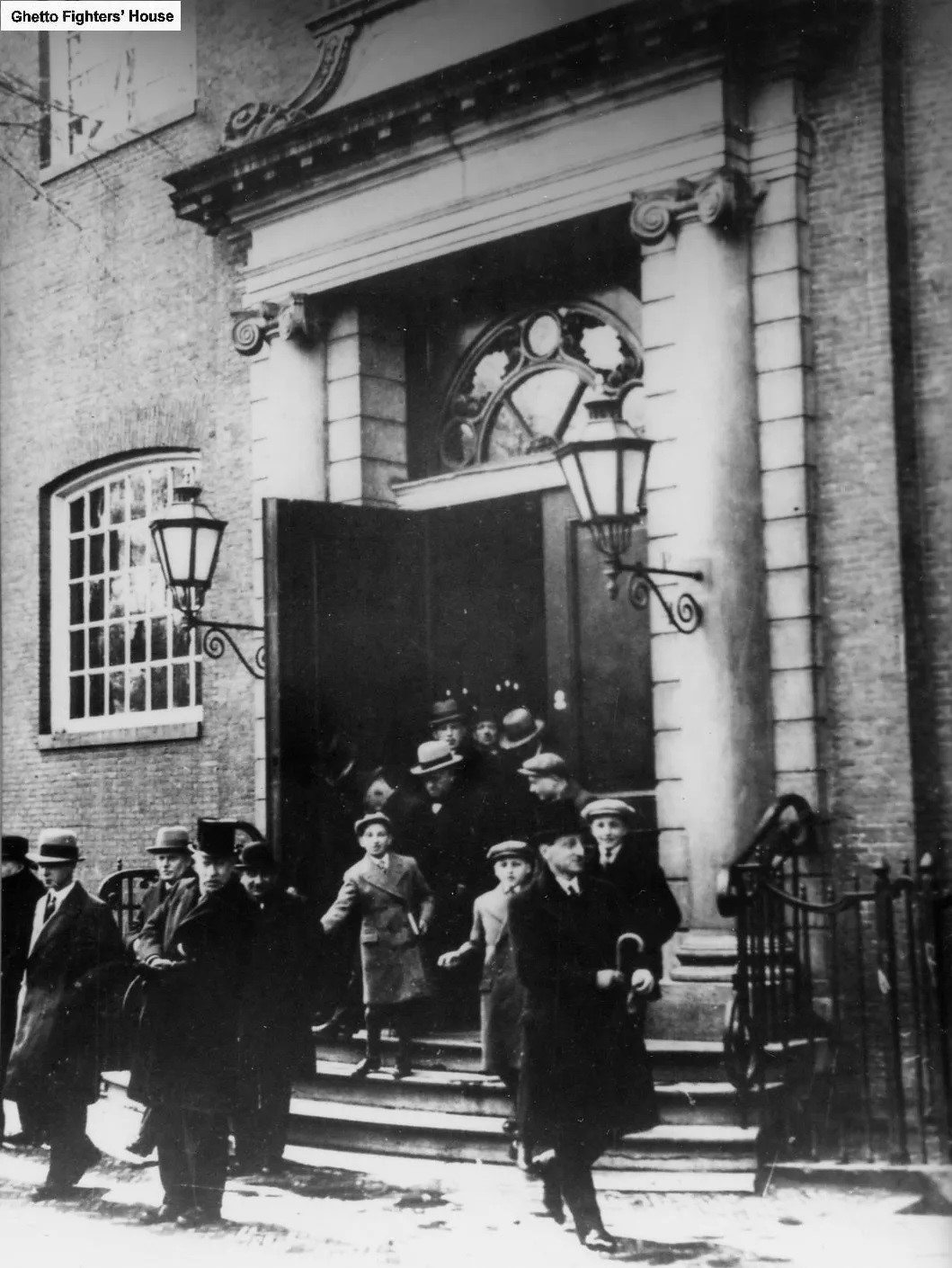
Jews leaving a synagogue in Amsterdam after Shabbat prayers
Edith Rothschild – Prayers in Auschwitz (Hungary)

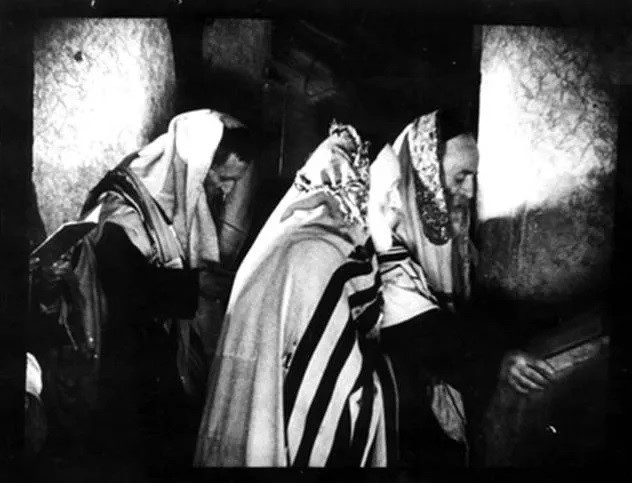
Jews praying secretly in the Warsaw Ghetto, Poland
Shmuel Braude - Prayer in Siberia (Ruzhin, Poland)

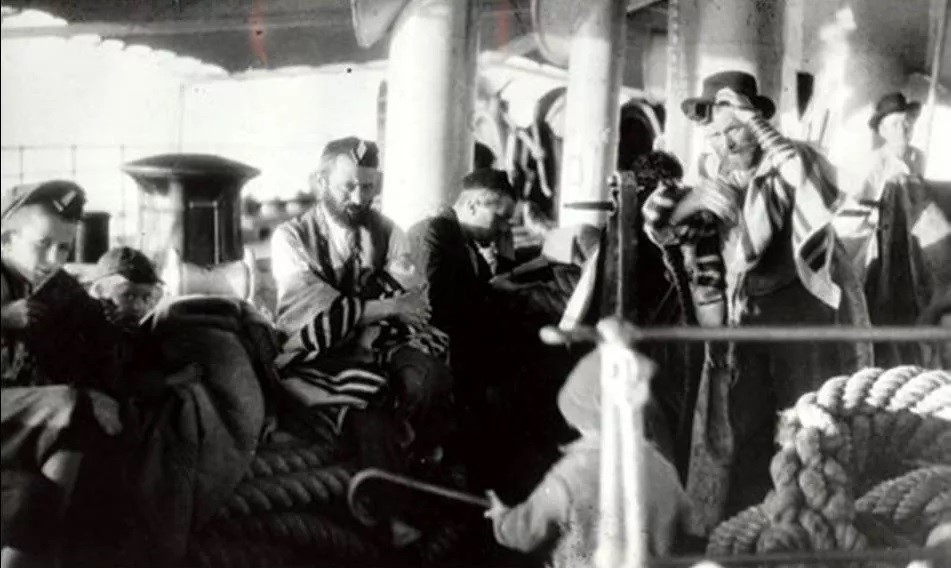
Jews praying on an illegal immigration ship on their way to the Land of Israel
Lessons in Faith and Prayer
Lessons in Faith and Prayer
The foundation of every prayer to G-d is faith in Him. Only those who believe with complete faith in the Creator of the World and its Leader can pray a true prayer to Him. Likewise, only those who believe in Him with complete faith feel obliged to pray to Him.
I once received from a Jew a lesson in prayer in an extermination camp, and that was because of an act I witnessed. One evening, when he entered our hut, he went to his bunk and began to pray Aravit (the evening prayer). During the prayer he wore his hat, even though this was a violation of the camp law which said: In the block, remove your hat. In the middle of the Shmona Esrai prayer, the block elder entered the room, a German prisoner with a green triangle, that is to say a criminal, who thanks to his "profession" won this "honourable position". When he saw that a Jew was standing there with a hat on his head, he shouted at him and ordered him to remove it. The Jew did not move and continued his prayer. We were all shocked to see his courage, which was not recognized immediately by his superior. Even though those with these "honourable" positions were themselves prisoners, we were as much afraid of them as we were of the SS men themselves… When he finished his prayer, the man removed his hat, approached the block elder and explained his act by saying that he was standing in prayer, and our custom is to cover the head while we pray; it was a miracle that the response of that evil person was nothing but harsh words, blasphemy, and arrogant mockery.
I do not know if the reader of this story understands the meaning of such service to G-d. It is assumed that there will be people who want to say that as a matter of law he was not allowed to pray in such a situation, and from a halachic (Jewish law) point of view they may be right. The question was whether this person was within the fence of a poisonous snake or not, which as we know, the halacha divides between one and the other, because when a poisonous snake is near you, you must stop your prayer. However, it seems to me that this Jew felt at the time that he had to talk to G-d, because he was unable to withdraw from His presence, even if it cost him his life. His devotion to G-d was limitless, so he did not move and continued to pray. That evening, I received a lesson from him about the meaning of praying to G-d.
We tried, as much as the conditions permittted, to pray our regular prayers, and as much as we remembered them by heart, since we usually didn't have prayerbooks. Sometimes we were able to pray as a group as well, because in our barracks, the youth barracks, there were boys from different occupied countries, most of them from Central Europe. However, there were also a large number of men from Greece, who were also reached by the murderous invaders. Among them were those who kept Torah and mitzvahs, who had a good command of the Hebrew language, so we could speak to each other in our own language.
Every day we would gather in one of the corners of the barrack for group prayer. We also had a pair of shared tefillin (phylacteries), so we could fulfill this mitzvah as well. The group prayer and the observance of the mitzvahs that we were able to observe together under those conditions, led to close bonds of friendship being formed among the young men who tried to observe the possible mitzvahs, even though our places of origin were a great distance apart.
Prayer has another meaning in times of trouble. There are situations in which a person feels that all hope is lost, it seems to him that the distance between him and death is like a step. All the snares of the underworld, the number of which he had never imagined, hold him, and he sees no possibility of escaping from them naturally. It seems to him that the end has come, there is no escape and salvation from this underworld. All those around him have no power to save him, because they too, like him, are in the same situation. And suddenly he feels that he must not despair. There is hope.
And indeed we did not despair, and that is why we prayed. Precisely in the hours when the danger was most tangible, precisely when we were in that dark hole in which we could not see a glimmer of light, precisely from there our cry to G-d erupted in our begging of the Creator, because we believed that even in these difficult hours, He is full of mercy.
Such difficult hours, in which I prayed from the bottom of my heart, were many. I still remember two of them well.
While I was still in Auschwitz, in the first camp I arrived at, which was called Birkenau, or Auschwitz 2. One day came when I thought and felt - here it has come. It seemed to me that the sword was right on my neck. Literally. I haven't seen any way out. Precisely at such a time the desire to continue living grows. You feel that you are very close to G-d and you believe with complete faith that only He can save you, and then a prayer emerges from you with full intention: G-d, save me!
It happened on Sunday, the 26th of Cheshvan. That day we were sent to the nearby camp to do some work. Suddenly, the news arrived that our entire camp was being evacuated, and only two barracks would remain, the sick barracks and our barrack - the youth barracks. Through the barbed wire fence between the camps, we could understand from our place of work that there was a basis for this news. We noticed long lines of prisoners escorted by SS men leaving the camp and marching towards the train. I can't describe how I felt that day. During these months, since we came to the Hell called Auschwitz, we learned what the selection between sick and healthy and between adults and youth meant. I trembled and trembled, if they sent everyone away from here and only left us, if so… I fought with myself not to continue thinking, but as I looked at the chimneys of the crematoriums so close, this shocking thought did not give me rest. Who knows what was in store for us today, who knows. The more a person feels the terrible danger, the more and more the desire to live arises in him, because in the end, the desire to live is the greatest of desires.
I entered one of the deserted barracks in the camp and poured out my heart in prayer. It seems to me that I have never prayed a prayer from the bottom of my heart like then. Isn't it in such moments that everyone must feel that only the Creator of the world is the only One Who can save him, and our sages have already taught us: "Even a sharp sword placed on a person's neck should not prevent himself from praying for mercy."
In the evening, we returned to the camp and relaxed a little. While it was true that many thousands left the camp that day, a large number of prisoners still remained in the camp apart from the sick barracks and our youth barracks. Apparently the time had not yet come to liquidate the camp.
(Shivtecha U'Mishantecha: Hirhurim U'Machshavot Achar HaShoah, Rabbi Sinai Adler)
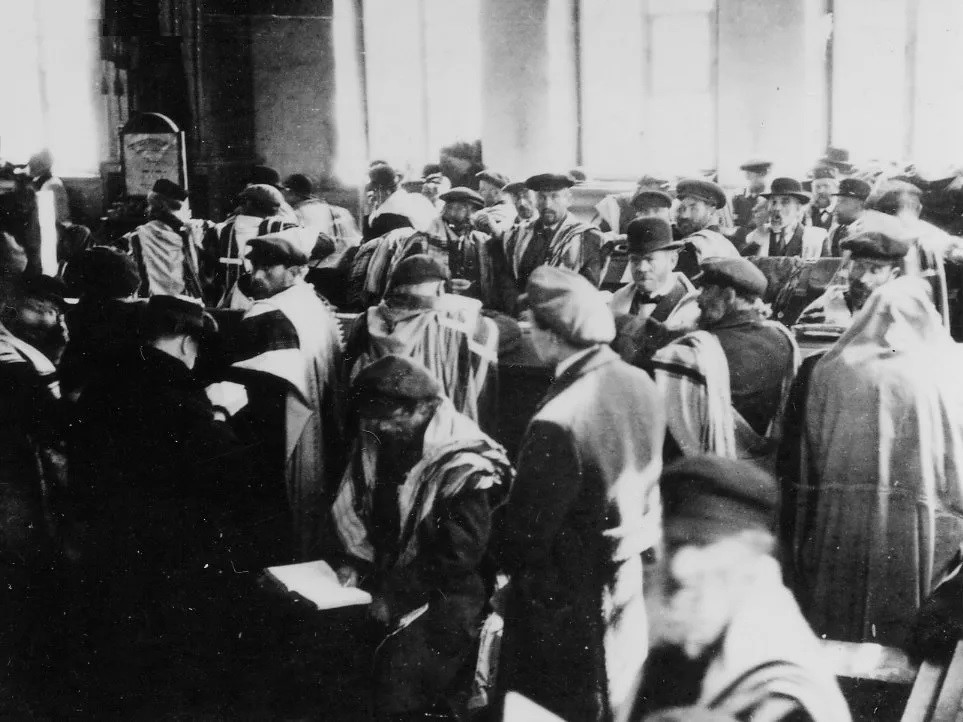
Jews wrapped in tallises (prayershawls) praying in the old synagogue in Alytus, Lithuania
Esther Katz – The Shacharit Prayer in the Forest (Rudzin, Poland)

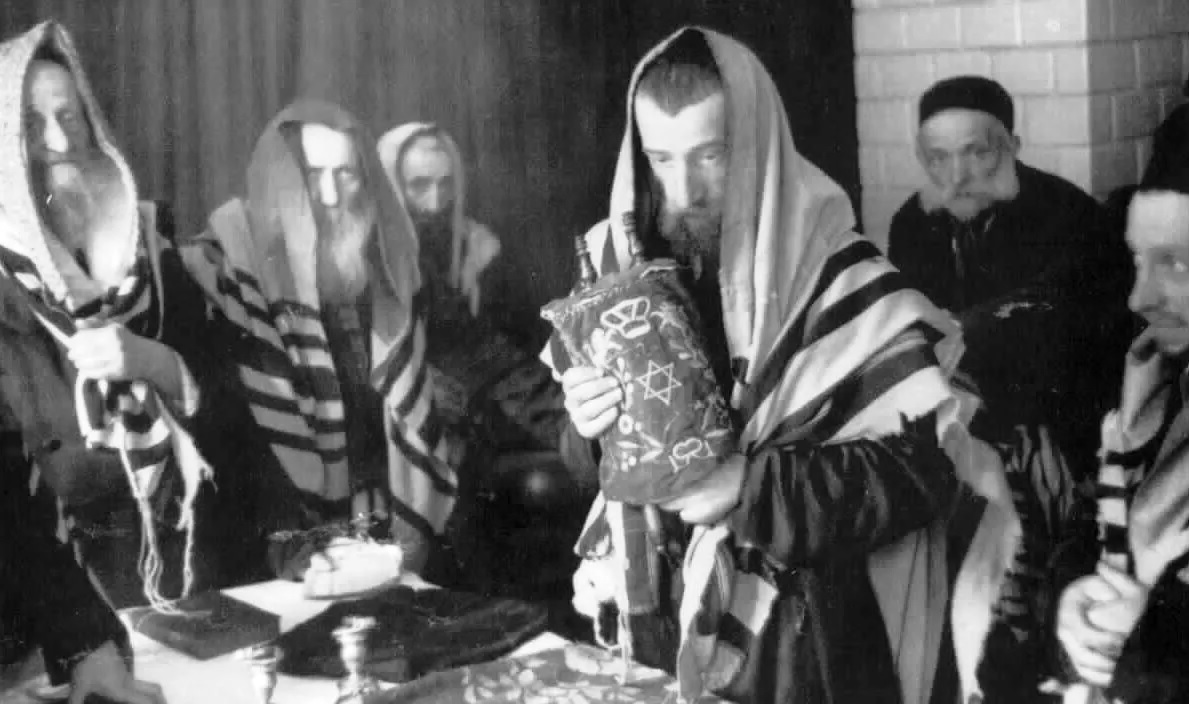
Jews wrapped in tallises (prayershawls) standing in prayer in a secret synagogue in the Warsaw Ghetto. Amongst them in Rabbi Yitzchak Meir Kanal
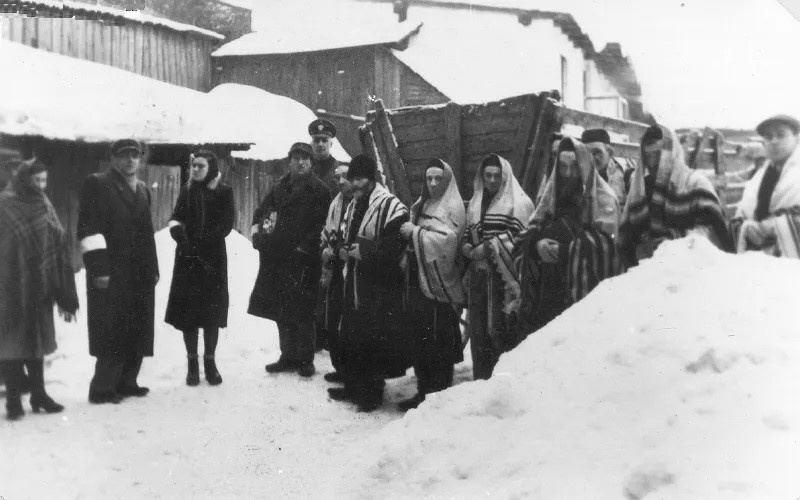
Jews who were taken out of the synagogue by the Germans in the middle of the High Holiday prayers standing in the snow wrapped in tallises (prayershawls)
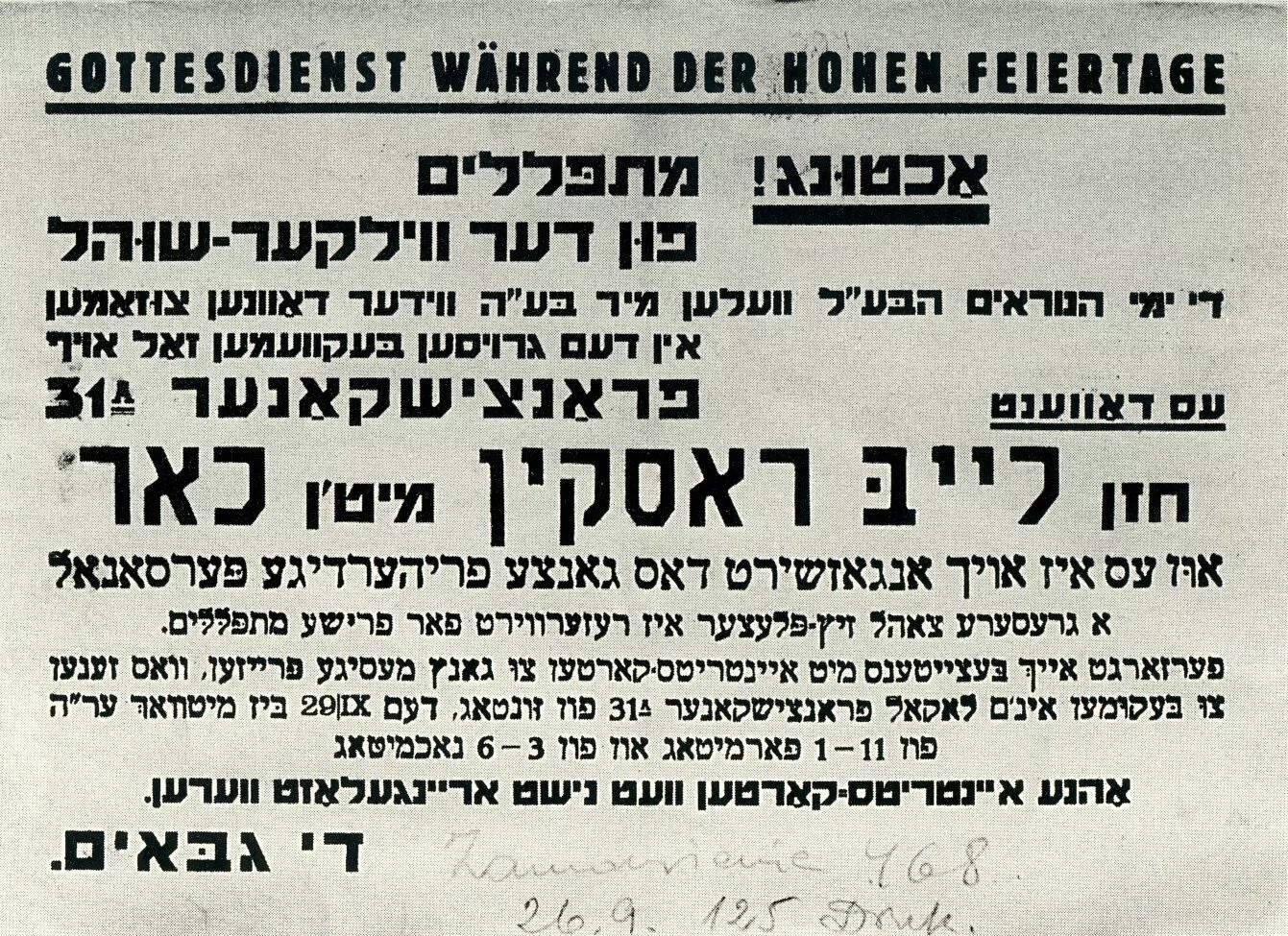
A notice published in the Lodz Ghetto stated that the High Holiday prayers will be held in participation of the cantor, Leib Raskin, and his choir
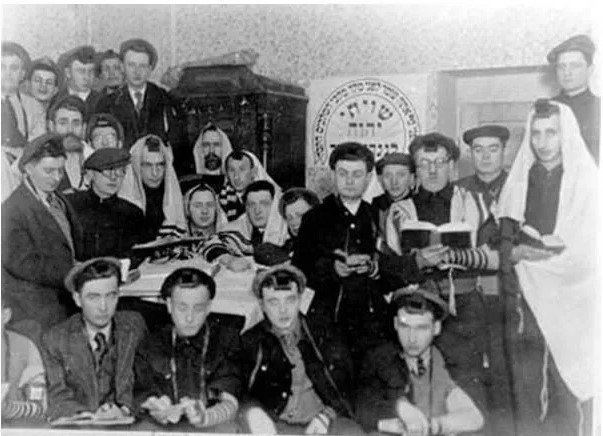
Praying in a synagogue organized by survivors in Bendin, Poland
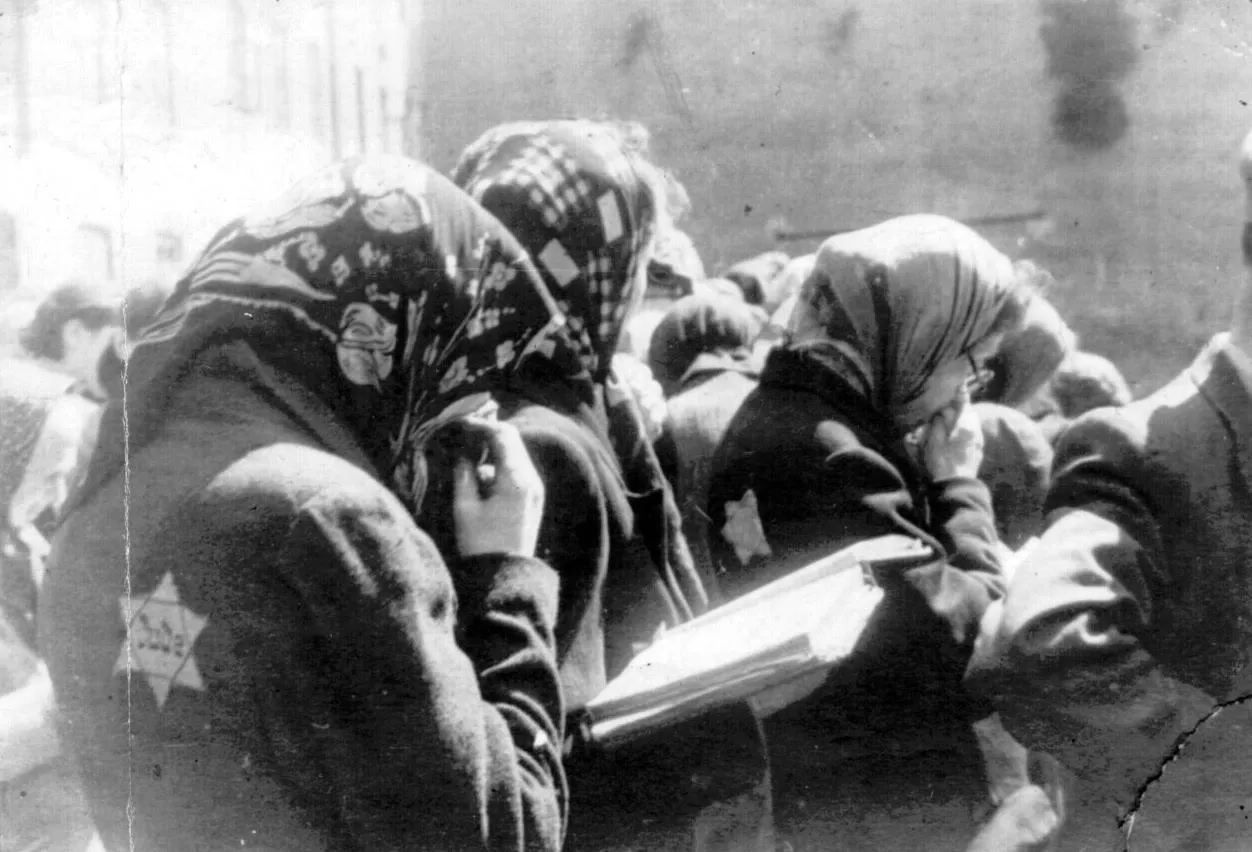
Jewish women in the Lodz Ghetto pray on the street
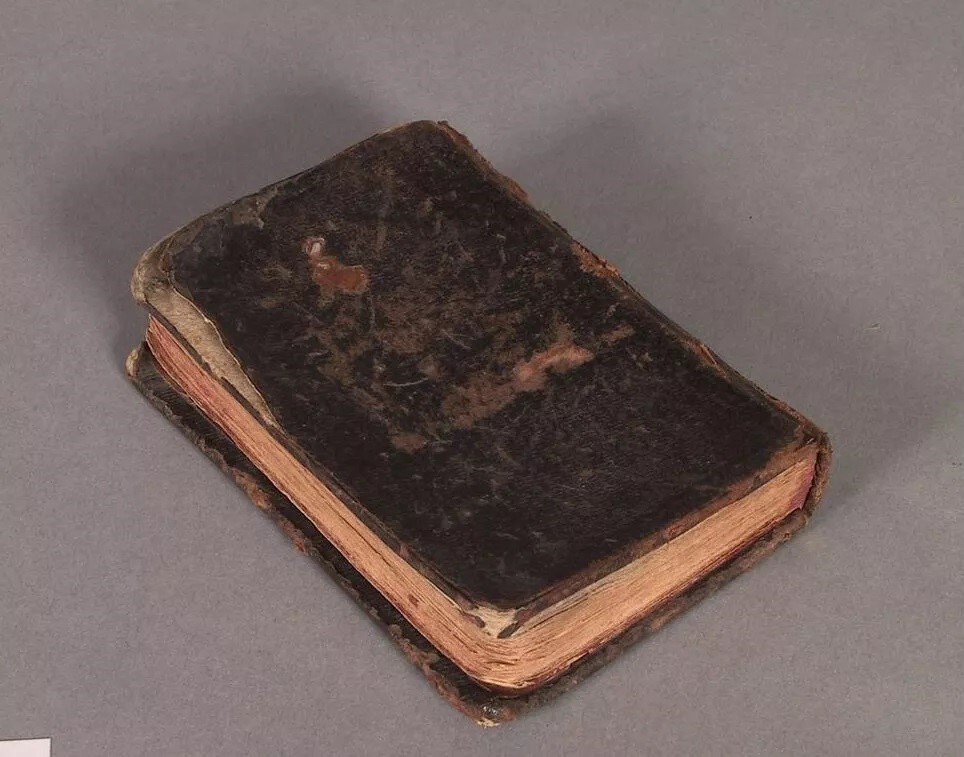
A prayerbook found amongst the ruins of the ghetto
Sarah Stein – A Song of Faith and Prayer in Auschwitz (Hungary)





















































